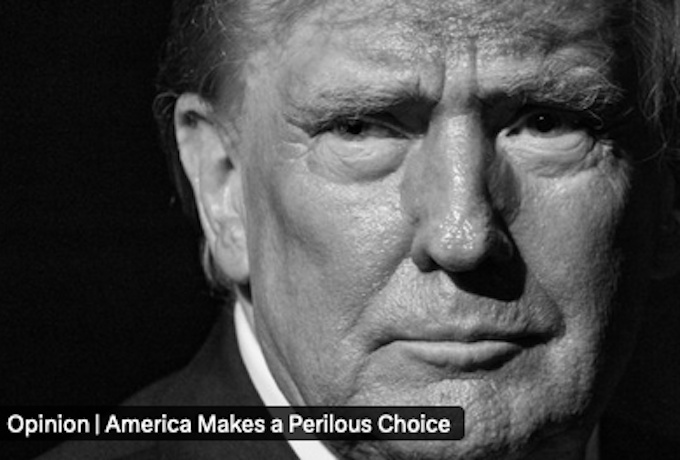
COMMENTARY: By Patrick Gathara
Anger and fear have greeted the return to power of former US strongman Donald Trump, a corrupt far-white extremist coup plotter who is also a convicted felon and rapist, following this week’s shock presidential election result.
Ethnic tensions have been on the rise with members of the historically oppressed minority Black ethnic group reporting receiving threatening text messages, warning of a return to an era of enslavement.
In a startling editorial, the tension-wracked country’s paper of record, The New York Times, declared that the country had made “a perilous choice” and that its fragile democracy was now on “a precarious course”.
- READ MORE: Kamala Harris’s support for Israel’s genocide in Gaza ‘betrayal of true feminism’
- ‘All-out catastrophe’: Famine fears as Israeli siege of north Gaza tightens
- Pacific nation leaders look forward to strengthened US relations with Trump
- All in all, Trump’s election is a calamity in he making — Paul Buchanan
- Other Israeli war on Gaza reports
President-elect Trump’s victory marks the second time in eight years the extremist leader, who is awaiting sentencing after being convicted of using campaign funds to pay off a porn star he had cheated on his wife with, has defeated a female opponent from the ruling Democratic Party.
Women continue to struggle to reach the highest office in the deeply conservative nation where their rights are increasingly under attack and child marriage is widespread.
This has prompted traumatised supporters of Vice-President Kamala Harris, who had been handpicked to replace the unpopular, ageing incumbent, Joe Biden, to accuse American voters of racism to sexism.
“It’s misogyny from Hispanic men, it’s misogyny from Black . . . who do not want a woman leading them,” insisted one TV anchor, adding that there “might be race issues with Hispanics that don’t want a Black woman as president of the United States.”
Hateful tribal rhetoric
The hateful tribal rhetoric has also included social media posts calling for any people of mixed race who failed to vote for Harris to be deported and for intensification of the genocide in Gaza due to Arab-American rejection of Harris over her support for the continued provision of weapons to the brutal apartheid state committing it.
America Makes a Perilous Choice https://t.co/sKW5ZZa3Q3
— Xandre Rodríguez (@xandrerodriguez) November 6, 2024
“Victory has many fathers but defeat is an orphan,” goes the saying popularised by former US President John F Kennedy, who was shot 61 years ago this month.
The reluctance to attribute the loss to the grave and gratuitous missteps made by the Harris campaign has mystified America-watchers around the world.
As an example, analysts point to her wholesale embrace of the Biden regime’s genocidal policy in the Middle East despite opinion polls showing that it was alienating voters.
Harris and her supporters had tried to counter that by claiming that Trump would also be genocidal and that she would ameliorate the pain of bereaved families in the US by lowering the price of groceries.
However, the election results showed that this was not a message voters appreciated. “Genocide is bad politics,” said one Arab-American activist.
Worried over democracy
As the scale of the extremists’ electoral win becomes increasingly clear, having taken control of not just the presidency but the upper house of Congress as well, many are worried about the prospects for democracy in the US which is still struggling to emerge from Trump’s first term.
Despite conceding defeat, Harris has pledged to continue to “wage this fight” even as pro-democracy protests have broken out in several cities, raising fears of violence and political uncertainty in the gun-strewn country.
This could imperil stability in North America and sub-Scandinavian Europe where a Caucasian Spring democratic revolution has failed to take hold, and a plethora of white-wing authoritarian populists have instead come to power across the region.
However, there is a silver lining. The elections themselves were a massive improvement over the chaotic and shambolic, disputed November 2020 presidential polls which paved the way for a failed putsch two months later.
This time, the voting was largely peaceful and there was relatively little delay in releasing results, a remarkable achievement for the numeracy-challenged nation where conspiracy theorists remain suspicious about the Islamic origins of mathematics, seeing it is as a ploy by the terror group “Al Jibra” to introduce Sharia Law to the US.
In the coming months and years, there will be a need for the international community to stay engaged with the US and assist the country to try and undertake much-needed reforms to its electoral and governance systems, including changes to its constitution.
During the campaigns, Harris loyalists warned that a win by Trump could lead to the complete gutting of its weak democratic systems, an outcome the world must work hard to avoid.
However, figuring out how to support reform in the US and engage with a Trump regime while not being seen to legitimise the election of a man convicted of serious crimes, will be a tricky challenge for the globe’s mature Third-World democracies.
Many may be forced to limit direct contact with him. “Choices have consequences,” as a US diplomat eloquently put it 11 years ago.
Patrick Gathara is a Kenyan journalist, cartoonist, blogger and author. He is also senior editor for inclusive storytelling at The New Humanitarian. This article was first published by Al Jazeera and is republished under Creative Commons.










































